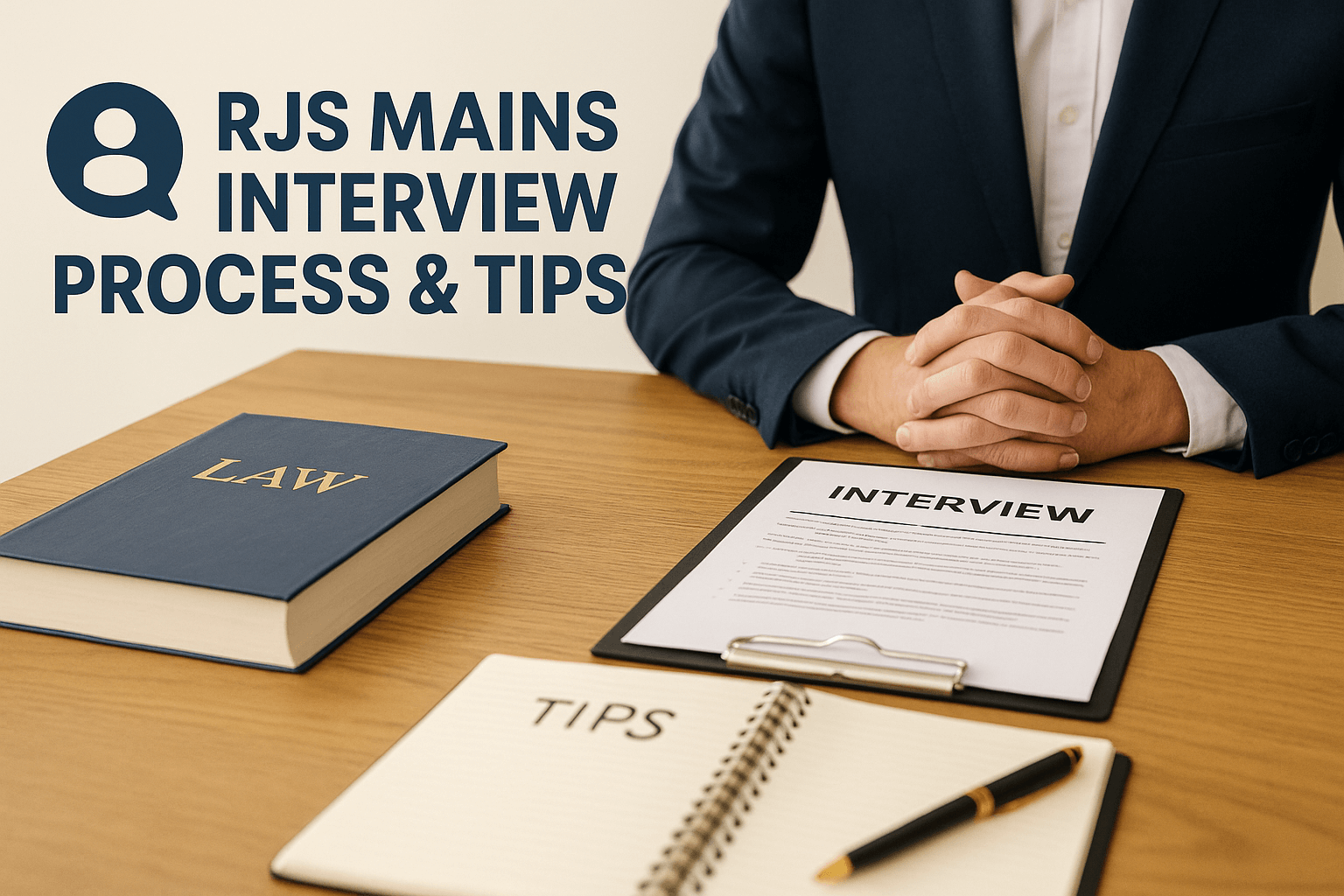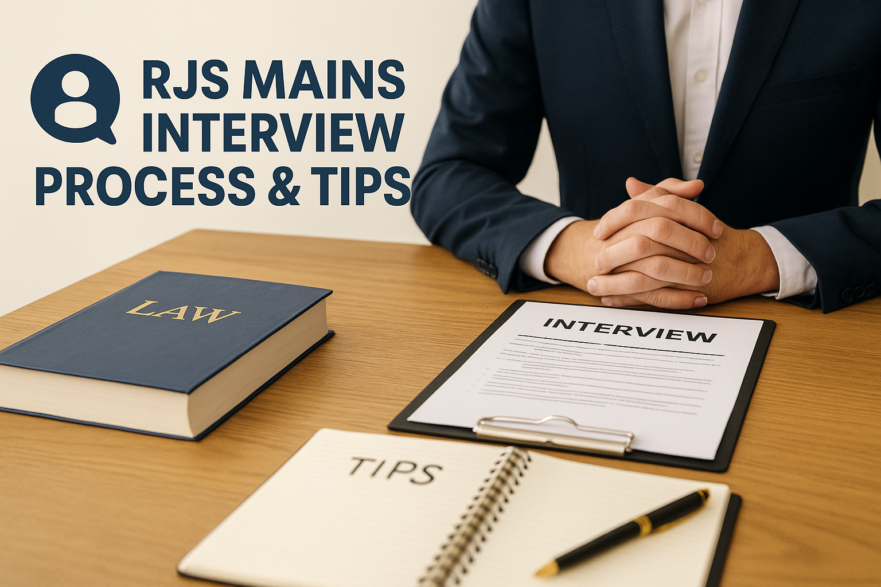
RJS Mains Interview — Process, Marking & Preparation Tips
The interview (viva voce) is the final stage in the Rajasthan Judicial Services (RJS) selection process. This guide explains the RJS interview format, what examiners look for, sample questions, and a practical preparation plan to help you perform confidently.
Need the full syllabus? See our RJS Mains 2025 – Complete Guide.
🔎 What is the RJS Interview?
The RJS interview tests a candidate’s overall suitability for judicial service. It evaluates personality, communication skills, legal awareness, academic record, and knowledge of local customs and language. Marks obtained in the interview are added to the written exam total to prepare the final merit list.
📋 Interview Format & Marking
- Duration: Usually 15–30 minutes per candidate.
- Marks: Varies by notification—commonly 50 marks (confirm from the specific recruitment notice).
- Panel Composition: Senior judges and judicial officers or a panel appointed by the High Court.
- Focus Areas: Academic record, personality, communication, general knowledge, legal awareness, and local culture/dialect proficiency.
🧭 What Examiners Look For
- Clarity of thought & expression: Can you explain ideas simply and coherently?
- Legal aptitude: Awareness of major statutes and important judgments.
- Ethical outlook & temperament: Judicial temperament, fairness, and impartiality.
- Local knowledge: Familiarity with Rajasthani dialects, local social customs and issues.
- Confidence & composure: Polite, humble, and professional demeanour under pressure.
🛠 Preparation Plan (6–8 Weeks)
- Week 1–2 — Profile Review: Prepare a short, honest autobiography (education, achievements, work experience, gaps). Prepare to explain any anomalies clearly.
- Week 3–4 — Current Affairs & Law: Read monthly current affairs summaries, major Supreme Court & Rajasthan High Court judgments, and recent legal reforms.
- Week 5 — Local Knowledge & Dialect: Brush up on Rajasthan’s social customs, issues affecting districts, and common Rajasthani words/phrases if you are not a native speaker.
- Week 6 — Mock Viva & Feedback: Do mock interviews with mentors. Focus on body language, eye-contact, tone, and concise answers.
- Final Week — Revision & Relaxation: Revise short notes, avoid cramming, and adopt light physical exercise to manage stress.
❓ Common Interview Questions (Sample)
Practice crisp, 1–2 minute answers for each. Below are common categories and sample prompts:
Personal & Academic
- Tell us about yourself and why you want to join the judiciary.
- Explain any academic gaps or low marks in your record.
Legal Knowledge & Opinion
- What are the recent changes in criminal law and how do they impact investigations?
- Discuss a Supreme Court judgment that changed your view of the law.
Current Affairs & Policy
- How should the judiciary approach public interest litigation?
- What is your opinion on pre-trial detention and bail reforms?
Local & Cultural
- What are the major social issues in rural Rajasthan? How can courts make relief accessible?
- Are you proficient in any Rajasthani dialect? (Be honest)
✔ Dos & ✖ Don’ts for the RJS Interview
Dos
- Be punctual, neatly dressed, and polite.
- Answer directly; keep responses structured (point → brief reasoning → example).
- Admit when you don’t know an answer, but explain how you would approach finding a solution.
- Use legal terms correctly and reference major judgments if relevant.
Don’ts
- Avoid arguing with the panel or being defensive.
- Do not bluff on facts, case names, or personal history.
- Steer clear of political rants or strong partisan positions.
🧩 Mock Interview Checklist
- Prepare a 60–90 second self-introduction.
- Bring certified copies of documents as per the notification.
- Practice maintaining calm eye contact and neutral body language.
- Record mock sessions and refine verbal clarity and posture.
🔍 How to Answer Tough Questions
Use the PREP technique: Point (state answer) → Reason (why) → Example (brief) → Point (restate). This keeps answers balanced and concise.
A — Point: Judicial activism refers to courts stepping in to protect rights; Reason: it corrects executive/legislative failures; Example: landmark PIL judgments improving access to basic services; Point: while useful, restraint is needed to respect separation of powers.
📘 Suggested Reading & Resources
- Short notes on major judgments (Supreme Court & Rajasthan High Court)
- Monthly current affairs booklets + legal updates
- Mock interview sessions with senior mentors
See our main RJS Mains guide and Delhi Law Academy study material for targeted interview notes and mock viva packages.
📚 Further Reading on RJS Mains Preparation
To help you prepare effectively for each part of the Rajasthan Judicial Services Mains Examination, explore these in-depth guides:
Boost Your RJS Mains 2025 Preparation with Delhi Law Academy
At Delhi Law Academy, we offer comprehensive RJS Mains 2025 Study Material covering all subjects in the latest syllabus, including updated Bare Acts, case law notes, and model answers. Our RJS Mains Classroom Course provides expert guidance, structured test series, and personalized mentoring to help you secure a top rank in the Rajasthan Judicial Services Exam. Whether you are a working professional or a full-time aspirant, our programs are designed to maximize your score in both Law and Language papers.
Start your preparation with Delhi Law Academy today and move one step closer to your judicial career.
Frequently Asked Questions
Student Testimonials
Contact us
📍 Delhi Law Academy – Jaipur Branch
6C, Tower 2, Coaching Hub, Pratap Nagar, Jaipur – 302033
📞 Phone:
+91 9911916552,
+91 8447285606
✉️ Email:
contactus@delhilawacademy.com
🌐 Website:
www.delhilawacademy.com






